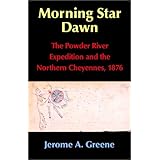 Over the years, National Park Service Historian Jerome Greene has produced a growing collection of fine books covering various battles of the Great Sioux War--SLIM BUTTTES, YELLOWSTONE COMMAND (Miles' Montana campaign, including the Wolf Mountain and Lame Deer battles), and two books of participants testimony on various battles and skirmishes in the war.
Over the years, National Park Service Historian Jerome Greene has produced a growing collection of fine books covering various battles of the Great Sioux War--SLIM BUTTTES, YELLOWSTONE COMMAND (Miles' Montana campaign, including the Wolf Mountain and Lame Deer battles), and two books of participants testimony on various battles and skirmishes in the war.MORNING STAR DAWN picks up where SLIM BUTTES, done in the early 1980s, leaves off.It follows the planning, logisitical preparation, execution and conclusion of the November 1876 Power River Expedition, under the command of General George Crook.The high point of the expedition was reached with the attack on the Red Fork of the Powder River, deep in the Big Horn mountains, when varioius cavalry components under the Fourth Cavalry's Ranald Mackenzie decimated a large Northern Cheyenne village.The battle happened exactly five months after Custer's defeat on the Little Big Horn and resulted in the utter destruction of the village.The Cheyenne were forced to flee the village, losing vital horses,clothing, weapons, and food, leaving the survivors little choice but to perish in the cruel winter cold or give themselves up at the agencies.The battle knocked the Cheyenne out of the remainder of the Sioux War and thus the army could focus its efforts exclusively on the Lakota under Sitting Bull, Crazy Horse, and other leaders.
The book is certainly well-written although not quite as good as the author's previous work, his classic NEZ PERCE SUMMER, 1877.Amidst all the details on the campaign, Greene provides a good retelling of the plight of all combatants, both White and Indian, faced with the burden of war in sub-zero Winter temparatures. The logistical problems of the campaign were greatly exacerbated by the weather, making it difficult to feed horses and mules with the requisite 35,000 pounds of grain a day in such a remote area.Facts such as these make one appreciate the importance of logistics in all wars.In terms of insight into Crook himself,I especially enjoyed the author's including the extracts from the writings of Colonel Richard Dodge and Dodge's low opinion of the close-mouthed Crook as both an organizer and leader of men.Despite Crook's foibles, his tenacity somehow got the job done, that and his having the highly-able Ranald Mackenzie carry out his attack.
Click Here to see more reviews about: Morning Star Dawn: The Powder River Expedition and the Northern Cheyennes, 1876 (Campaigns and Commanders Series, Volume 2) (Hardcover)
Product Description:
From a recognized authority on the High Plains Indians wars comes thisnarrative history blending both American Indian and U.S. Army perspectiveson the attack that destroyed the village of Northern Cheyenne chief MorningStar.Of momentous significance for the Cheyenne as well as the army,this November 1876 encounter, coming exactly six months to the day afterthe Custer debacle at the Little Bighorn, was part of the Powder RiverExpedition waged by Brigadier General George Crook against the Indians.Vital to the larger context of the Great Sioux War, the attack on MorningStar's village encouraged the eventual surrender of Crazy Horse and hisSioux followers.
Unbiased in its delivery, Morning Star Dawn offers the most thorough modernscholarly assessment of the Powder River Expedition.It incorporatespreviously unsynthesized data from the National Archives, the Library ofCongress, the U.S. Army Military History Institute, and other repositories,and provides an examination of all facets of the campaign leading to andfollowing the destruction of Morning Star's village.
Buy cheap Morning Star Dawn: The Powder River Expedition and the Northern Cheyennes, 1876 (Campaigns and Commanders Series, Volume 2) (Hardcover) now
0 comments:
Post a Comment